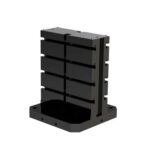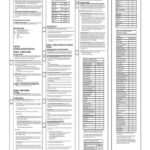What are Flex PCBs?
Flex PCBs, also known as flexible printed circuit boards, are a type of PCB that can bend and twist without damaging the electrical components. They are made from flexible plastic substrates, such as polyimide or polyester, and can be single-sided, double-sided, or multi-layered. Flex PCBs are commonly used in applications that require flexibility, such as wearable devices, medical equipment, and automotive electronics.
Advantages of Flex PCBs
Flex PCBs offer several advantages over traditional rigid PCBs, including:
- Flexibility: Flex PCBs can bend and twist without breaking, making them ideal for applications that require movement or flexibility.
- Durability: Flex PCBs are more durable than rigid PCBs and can withstand repeated bending and flexing without damage.
- Space-saving: Flex PCBs can be designed to fit into tight spaces, reducing the overall size and weight of electronic devices.
- Improved signal integrity: Flex PCBs can reduce signal interference and improve signal integrity, especially in high-speed applications.
- Cost-effective: Flex PCBs can reduce the overall cost of electronic devices by eliminating the need for connectors and cables.
Top 10 Flex PCB Manufacturers
1. Nippon Mektron
Nippon Mektron, a subsidiary of Nitto Denko Corporation, is a leading flex PCB manufacturer based in Japan. The company has been in operation for over 50 years and has a global presence, with manufacturing facilities in Japan, China, South Korea, and the United States. Nippon Mektron specializes in high-density interconnect (HDI) flex PCBs, which are used in a wide range of applications, including smartphones, tablets, and wearable devices.
2. Zhen Ding Technology
Zhen Ding Technology is a Taiwan-based flex PCB manufacturer that has been in operation since 1998. The company has manufacturing facilities in Taiwan and China and is known for its high-quality flex PCBs and quick turnaround times. Zhen Ding Technology serves a wide range of industries, including consumer electronics, automotive, and medical devices.
3. Flexium Interconnect
Flexium Interconnect is another Taiwan-based flex PCB manufacturer that has been in operation since 1998. The company specializes in high-density interconnect (HDI) flex PCBs and has manufacturing facilities in Taiwan and China. Flexium Interconnect serves a wide range of industries, including consumer electronics, automotive, and medical devices.
4. Career Technology
Career Technology is a Taiwan-based flex PCB manufacturer that has been in operation since 1984. The company has manufacturing facilities in Taiwan and China and is known for its high-quality flex PCBs and quick turnaround times. Career Technology serves a wide range of industries, including consumer electronics, automotive, and medical devices.
5. Fujikura
Fujikura is a Japanese flex PCB manufacturer that has been in operation since 1885. The company has manufacturing facilities in Japan, China, and the United States and is known for its high-quality flex PCBs and innovative technologies. Fujikura serves a wide range of industries, including automotive, aerospace, and medical devices.
6. Sumitomo Electric Industries
Sumitomo Electric Industries is a Japanese flex PCB manufacturer that has been in operation since 1897. The company has manufacturing facilities in Japan, China, and the United States and is known for its high-quality flex PCBs and innovative technologies. Sumitomo Electric Industries serves a wide range of industries, including automotive, aerospace, and medical devices.
7. Interflex
Interflex is a South Korean flex PCB manufacturer that has been in operation since 1999. The company has manufacturing facilities in South Korea and China and is known for its high-quality flex PCBs and quick turnaround times. Interflex serves a wide range of industries, including consumer electronics, automotive, and medical devices.
8. BHflex
BHflex is a Chinese flex PCB manufacturer that has been in operation since 2004. The company has manufacturing facilities in China and is known for its high-quality flex PCBs and competitive pricing. BHflex serves a wide range of industries, including consumer electronics, automotive, and medical devices.
9. Ichia Technologies
Ichia Technologies is a Taiwan-based flex PCB manufacturer that has been in operation since 1998. The company has manufacturing facilities in Taiwan and China and is known for its high-quality flex PCBs and quick turnaround times. Ichia Technologies serves a wide range of industries, including consumer electronics, automotive, and medical devices.
10. Xiamen Hongxin Electron-Tech
Xiamen Hongxin Electron-Tech is a Chinese flex PCB manufacturer that has been in operation since 2006. The company has manufacturing facilities in China and is known for its high-quality flex PCBs and competitive pricing. Xiamen Hongxin Electron-Tech serves a wide range of industries, including consumer electronics, automotive, and medical devices.

Comparison Table
| Manufacturer | Location | Specialties | Industries Served |
|---|---|---|---|
| Nippon Mektron | Japan, China, South Korea, USA | HDI flex PCBs | Consumer electronics, smartphones, tablets, wearables |
| Zhen Ding Technology | Taiwan, China | High-quality flex PCBs, quick turnaround | Consumer electronics, automotive, medical devices |
| Flexium Interconnect | Taiwan, China | HDI flex PCBs | Consumer electronics, automotive, medical devices |
| Career Technology | Taiwan, China | High-quality flex PCBs, quick turnaround | Consumer electronics, automotive, medical devices |
| Fujikura | Japan, China, USA | High-quality flex PCBs, innovative technologies | Automotive, aerospace, medical devices |
| Sumitomo Electric Industries | Japan, China, USA | High-quality flex PCBs, innovative technologies | Automotive, aerospace, medical devices |
| Interflex | South Korea, China | High-quality flex PCBs, quick turnaround | Consumer electronics, automotive, medical devices |
| BHflex | China | High-quality flex PCBs, competitive pricing | Consumer electronics, automotive, medical devices |
| Ichia Technologies | Taiwan, China | High-quality flex PCBs, quick turnaround | Consumer electronics, automotive, medical devices |
| Xiamen Hongxin Electron-Tech | China | High-quality flex PCBs, competitive pricing | Consumer electronics, automotive, medical devices |
Frequently Asked Questions (FAQ)
1. What are the benefits of using flex PCBs over rigid PCBs?
Flex PCBs offer several benefits over rigid PCBs, including flexibility, durability, space-saving, improved signal integrity, and cost-effectiveness. Flex PCBs can bend and twist without breaking, making them ideal for applications that require movement or flexibility. They are also more durable than rigid PCBs and can withstand repeated bending and flexing without damage. Flex PCBs can be designed to fit into tight spaces, reducing the overall size and weight of electronic devices. Additionally, flex PCBs can reduce signal interference and improve signal integrity, especially in high-speed applications. Finally, flex PCBs can reduce the overall cost of electronic devices by eliminating the need for connectors and cables.
2. What industries commonly use flex PCBs?
Flex PCBs are commonly used in a wide range of industries, including consumer electronics, automotive, aerospace, and medical devices. In consumer electronics, flex PCBs are used in smartphones, tablets, wearable devices, and other portable electronics. In the automotive industry, flex PCBs are used in various applications, such as infotainment systems, driver assistance systems, and engine control modules. In the aerospace industry, flex PCBs are used in avionics, satellite communications, and other high-reliability applications. In the medical device industry, flex PCBs are used in implantable devices, diagnostic equipment, and other medical electronics.
3. What should I consider when choosing a flex PCB manufacturer?
When choosing a flex PCB manufacturer, there are several factors to consider, including:
- Quality: Choose a manufacturer that has a proven track record of producing high-quality flex PCBs that meet industry standards and customer specifications.
- Capabilities: Consider the manufacturer’s capabilities, such as their ability to produce HDI flex PCBs, their manufacturing capacity, and their turnaround times.
- Location: Consider the manufacturer’s location and how it may impact shipping times, communication, and overall costs.
- Industries served: Choose a manufacturer that has experience serving the industries that you are targeting, as they may have specialized knowledge and expertise in those areas.
- Price: Consider the manufacturer’s pricing and how it compares to other manufacturers in the market. However, be cautious of manufacturers that offer significantly lower prices, as this may indicate lower quality or hidden costs.
4. What is the typical turnaround time for flex PCB manufacturing?
The typical turnaround time for flex PCB manufacturing can vary depending on the complexity of the design, the quantity ordered, and the manufacturer’s capacity. In general, most flex PCB manufacturers offer standard lead times of 2-3 weeks for prototype quantities and 4-6 weeks for production quantities. However, some manufacturers may offer expedited services for an additional fee, which can reduce the turnaround time to as little as a few days.
5. How do I ensure the quality of my flex PCBs?
To ensure the quality of your flex PCBs, there are several steps you can take:
- Choose a reputable manufacturer: As mentioned earlier, choose a manufacturer that has a proven track record of producing high-quality flex PCBs that meet industry standards and customer specifications.
- Provide clear and detailed specifications: Provide your manufacturer with clear and detailed specifications for your flex PCBs, including materials, dimensions, tolerances, and any special requirements.
- Request samples: Request samples of your flex PCBs before placing a large order to ensure that they meet your specifications and quality requirements.
- Perform quality inspections: Perform quality inspections on your flex PCBs upon receipt to ensure that they meet your specifications and are free of defects.
- Communicate with your manufacturer: Maintain open communication with your manufacturer throughout the manufacturing process to ensure that any issues or concerns are addressed promptly.
Conclusion
Flex PCBs have become an essential component in many electronic devices, offering flexibility, durability, and space-saving benefits. As the demand for flex PCBs continues to grow, manufacturers around the world are striving to meet the market’s needs with high-quality products and innovative technologies. The top 10 flex PCB manufacturers highlighted in this article are some of the best in the industry, offering a wide range of capabilities and serving a variety of industries. When choosing a flex PCB manufacturer, it is important to consider factors such as quality, capabilities, location, industries served, and price. By following these guidelines and maintaining open communication with your manufacturer, you can ensure that your flex PCBs meet your specifications and quality requirements.






Leave a Reply